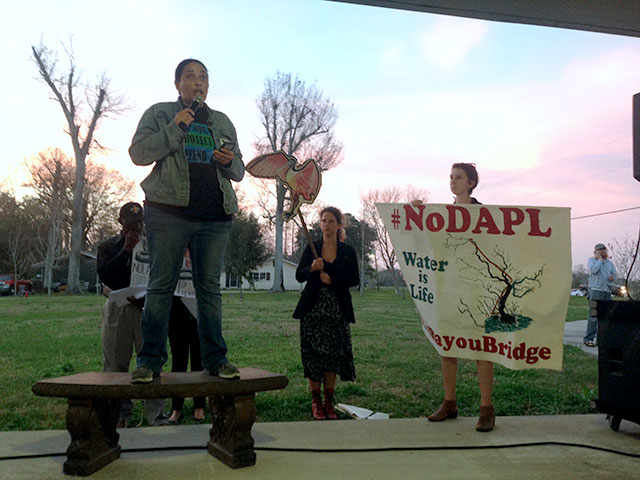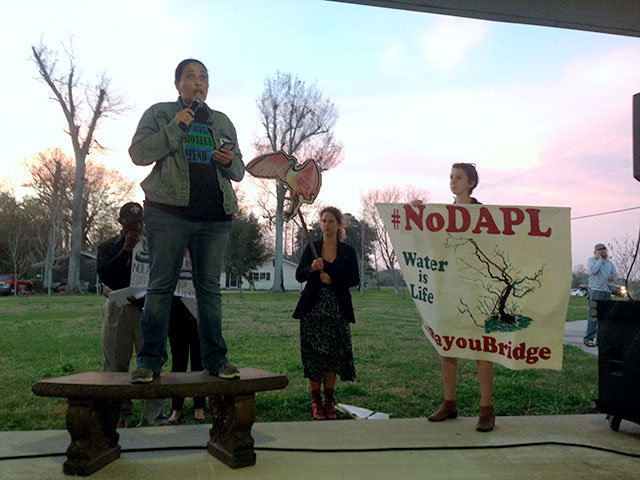
Support justice-driven, accurate and transparent news — make a quick donation to Truthout today!
 Cherri Foytlin, a Native American environmental activist who spent time with the Standing Rock protesters in North Dakota, addresses a crowd of anti-pipeline protesters outside a permit hearing on the Bayou Bridge pipeline in Napoleonville, Louisiana. (Photo: Mike Ludwig)
Cherri Foytlin, a Native American environmental activist who spent time with the Standing Rock protesters in North Dakota, addresses a crowd of anti-pipeline protesters outside a permit hearing on the Bayou Bridge pipeline in Napoleonville, Louisiana. (Photo: Mike Ludwig)
When I walked into the public hearing on the Bayou Bridge pipeline in Napoleonville, Louisiana, it was packed with anti-pipeline activists. The Bayou Bridge, which is proposed by Energy Transfer Partners (ETP), the same company behind the Dakota Access pipeline in North Dakota, has been met with intensifying resistance. When the hearing kicked off, I expected ETP to constrain the conversation to its main argument for winning over locals — that the pipeline would safely bring money and jobs.
I was wrong.
Cary Farber, the pipeline’s project manager, was the first to speak Wednesday in the crowded gymnasium south of Baton Rouge, where massive petrochemical storage tanks and the brightly lit towers of oil refineries are nestled among gentle bayous and cow pastures. Farber probably understood that the 200 or so attendees holding signs and banners opposing Bayou Bridge also had strong feelings about the nation’s new president, and he went right for the throat.
The Bayou Bridge pipeline is exactly the kind of project that fits into President Donald Trump’s vision for the country, Farber said, with extra emphasis on “Donald” and “Trump.”
At this point, Farber is well acquainted with protesters. Resistance to the ETP’s oil pipelines has been one of the biggest protest stories of the past year. Bayou Bridge has not received as much coverage as Dakota Access, but there has been a sustained campaign to block construction since Trump was elected. Running from 163 miles across much of southern Louisiana, Bayou Bridge would be the last major leg of a pipeline network originating with the Dakota Access pipeline in North Dakota, where the Standing Rock Sioux and other Water Protectors inspired an international movement with their fierce campaign against project.
Bayou Bridge would also cross the Atchafalaya Basin, the largest swamp in the United States, directly impacting 600 acres of sensitive wetlands, according to the Gulf Restoration Network. Like a massive natural sponge, these wetlands provide a flood buffer in the same part of the state that experienced severe flooding last year after unusually heavy rains linked to climate disruption.
The Obama administration temporarily blocked the Dakota Access project in December and ordered regulators to study alternative routes for the pipeline, but Trump reversed the government’s position last month and issued a triumphant executive order calling for the pipeline to be completed. On Tuesday, the Army Core of Engineers issued a final permit for the project, and activist resistance is expected to continue at Standing Rock.
Farber’s message to his opponents was clear: You can march and yell all you want, but we won the election and this pipeline is coming through. The antagonism didn’t stop there. Shortly after Farber spoke, an attorney for a local sheriff’s office ridiculed the Water Protectors at Standing Rock, calling them “hostile and often violent,” even though it was police who perpetrated so much violence in North Dakota.
By this point in the hearing, which was supposed to center around a state permit to build in coastal areas, the crowd had erupted. Anti-pipeline activists were chanting and shouting at every pro-pipeline speaker. An endorsement of the pipeline from former Louisiana Sen. Mary Landrieu, a Democrat from New Orleans and friend of the oil and gas industry, could hardly be heard over the shouting.
Amid the chants, the businessmen touted tax revenues and job creation. Environmentalists lamented yet another oil and gas project in a state that bear visible scars from the industry and has suffered from a long list of spills and disasters. A nervous crawfish industry was assured that their business in the Atchafalaya would be protected.
Lawmakers admitted that the oil and gas industry has had its problems, but they made it clear that fossil fuel is the economic lifeblood of the state, and as oil wells in the Gulf of Mexico start to dry up, fresh crude from faraway shale fracking booms will be needed to keep Louisiana’s many refineries, petrochemical plants and export terminals generating jobs and tax revenue. Plus, they said, this pipeline would be different than the aging and accident-prone infrastructure sprawled across the state. It would be new, modern and safe.
Environmental activists pointed out that this promise is a mythology. Existing pipelines and storage tanks are already leaking, and accidents in the industry are commonplace — Energy Transfer Partners reported 69 accidents nationwide in 2016 alone. Why should we trust the industry when it says that this pipeline will be different?
Native activists from a tribal community in Louisiana’s Gulf coast lowlands pointed out that coastal erosion caused by rising seas and oil and gas development is threatening their historic homesteads. For them, the Bayou Bridge pipeline is not just an economic choice — it’s an existential one.
Pipeline proponents will undoubtedly point out that some in the anti-pipeline camp were not local advocates, but urbanites and hipster transplants removed from the concerns of Louisiana workers. However, the presence of young activists and punk rockers from New Orleans proves that the issue is bigger than leaks, spills and jobs. They have clearly inspired by the Standing Rock movement for Indigenous liberation and environmental justice, as well as the general resistance to Trump that has been gaining steam across the country. Young people face an uncertain future as the climate shifts, so of course they are joining fights against Big Oil.
If this pipeline hearing were held five years ago, it probably would have been more focused on crawfish harvests and regulatory inspections. Instead, it was about Trumpism and climate disruption. It was about exploitation and Indigenous erasure. It was about competing visions for a country that yearns for clean energy but still has massive oil and gas potential, and now a president who wants it all unlocked as quickly and cheaply as possible.
The hearing was rowdy because, right now, people everywhere are impassioned and mobilized to resist Trump’s plans for this country. Those plans involve a lot of oil drilling and a lot of pipelines that would stretch across so many state lines, Native lands, neighborhoods and ecosystems, and every inch of them is propelling people to fight back and join a massive movement built on very local resistance.
At this point, the political cards are stacked in favor of the Dakota Access and Bayou Bridge pipelines, but this is not deterring activists. It’s only strengthening their resolve to stop them.
A terrifying moment. We appeal for your support.
In the last weeks, we have witnessed an authoritarian assault on communities in Minnesota and across the nation.
The need for truthful, grassroots reporting is urgent at this cataclysmic historical moment. Yet, Trump-aligned billionaires and other allies have taken over many legacy media outlets — the culmination of a decades-long campaign to place control of the narrative into the hands of the political right.
We refuse to let Trump’s blatant propaganda machine go unchecked. Untethered to corporate ownership or advertisers, Truthout remains fearless in our reporting and our determination to use journalism as a tool for justice.
But we need your help just to fund our basic expenses. Over 80 percent of Truthout’s funding comes from small individual donations from our community of readers, and over a third of our total budget is supported by recurring monthly donors.
Truthout has launched a fundraiser to add 432 new monthly donors in the next 7 days. Whether you can make a small monthly donation or a larger one-time gift, Truthout only works with your support.